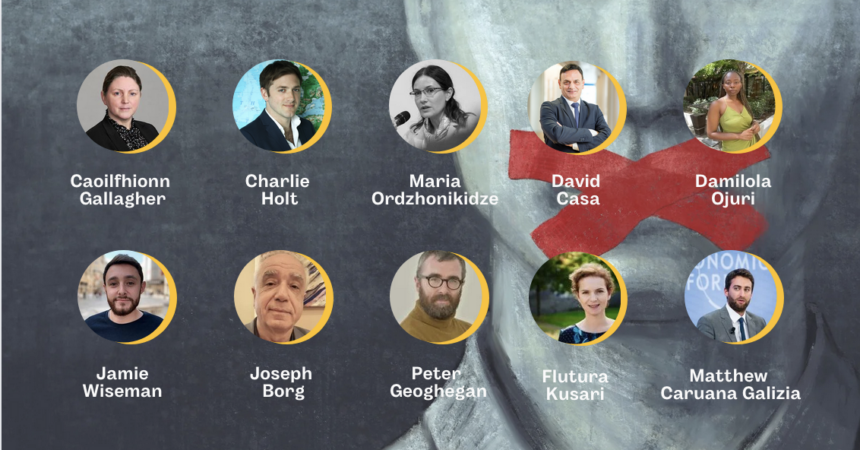As European institutions tussle over the scope and reach of new anti-SLAPP rules, The Shift will place the upcoming legislation high on the agenda at Friday’s conference, bringing the topic home to a place which has the highest rate of such lawsuits per capita, in the whole of Europe.
The event will host an impressive line of speakers, including European Parliament President Roberta Metsola via recorded message, Caoilfhionn Gallagher KC from Doughty Street Chambers, UK, Flutura Kursari from the European Centre for Press and Media Freedom, and decision-makers from Greenpeace, Justice for Journalists Foundation, Thomson Reuters Foundation, and more.
Strategic Lawsuits Against Public Participation (SLAPPs) are legal suits filed by, often wealthy and powerful individuals or entities against journalists, media platforms, or whistleblowers. Instead of raising legitimate concerns, they are usually filed in a spurious manner with the intent to drain the plaintiff of all resources or intimidate them into silence.
In April 2022, the European Commission proposed a bloc-wide law to counter these abusive suits and to protect journalists and human rights defenders from them. The draft is currently being discussed by the European Parliament and the European Council, with stances differing significantly on whether it goes far enough regarding protection.
While the Commission’s version of the directive was praised for its strong provisions, the Council’s proposed amendments have raised concerns about watering down measures that would protect journalists and rights watchdogs.
Two crucial elements
The Commission’s directive version includes two significant elements crucial in combating SLAPPs.
The first is an early dismissal mechanism, which allows courts to dismiss cases once they have been identified as abusive lawsuits. This mechanism is essential because the purpose of a SLAPP is not to determine the guilt of journalists or human rights defenders but to put them under pressure, drain their time, energy, and money, and discourage others from taking a similar line.
The second element in the Commission’s proposal covers cross-border cases affecting more than one member state. This provision is crucial for financial crimes involving money being moved across borders. However, the Council’s proposed amendments seek to set a higher bar for early dismissal of cases and remove the broad definition of cross-border cases, which could weaken the law’s effectiveness.
Organisations advocating for press freedom, some of which will be present at the conference, have already expressed frustration with the Council’s position, as they believe the proposed directive is too weak.
They argue that without an effective early dismissal mechanism and other necessary safeguards, journalists will still be exposed to exorbitant legal and court fees for frivolous cases instituted against them.
In July, the European Parliament approved a more robust version of the Commission’s directive to counter the Council’s position, including expanding the definitions of abusive court proceedings and public participation and a broader scope for the cross-border element needed to trigger the directive.
The proposal also includes setting up national registers of anti-SLAPP court decisions, a Union-wide record run by the Commission, and creating national “one-stop shops” to aid SLAPP victims with legal and mental health resources.
Silencing Freedom. Weaponising the Law
The anti-SLAPP directive, its scope, and which proposal has more teeth are set to be central to discussions at Friday’s conference “Silencing Freedom. Weaponising the Law”, organised by The Shift and supported by the Justice for Journalists Foundation (JFJF).
The event will bring together international and local legal experts and members of the media community to discuss how SLAPPs and other legal methods are used to harass journalists and how this directly impacts the information they provide to the public.
The debate will delve into the evolving nature and definitions of SLAPPs, their impact on journalists’ daily work and the public’s right to know, and the tools developed to fight against them.
It will also review the legislative changes at the EU level and assess whether they provide enough protection to journalists against legal harassment.
Daphne’s Law
But the holding of such a conference in Malta has additional importance. The EU’s anti-SLAPP law, informally known as “Daphne’s Law”, is an homage to the countless SLAPPs levied against her during her lifetime and the 40 still pending when she was assassinated.
Her family inherited many of the suits, filed mainly by Labour Party politicians and their associates, and are still fighting them today, six years after her death.
Furthermore, the Maltese government has vehemently fought against introducing any SLAPP legislation, particularly under the rule of disgraced former prime minister Joseph Muscat.
Muscat had even given his blessing to foreign entities involved in questionable deals with his government to threaten and go ahead with SLAPPs against journalists in Malta, who were on the trail of their corruption.
But Maltese MEP David Casa, who will also be present on Friday, is one of the lawmakers seeking to impose a firm directive that has repeatedly emphasised the importance of an effective early dismissal mechanism and the need to shift the burden of proof to those bringing the claim.
The final shape of the EU anti-SLAPP directive is expected to be confirmed with a plenary vote by the end of 2023.
However, the negotiations between European lawmakers are ongoing, and which EU institution will prevail remains to be seen.
Registrations for the conference are open. The conference agenda can be viewed here, and the panellists’ biographies can be found here.













